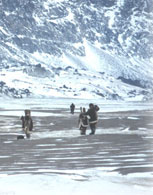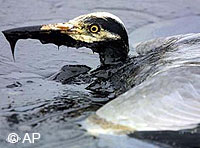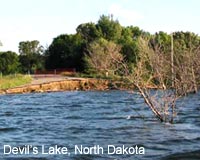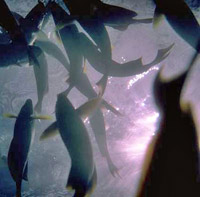
News |
- Public Campaign - Ontario's Northern Boreal
- US Mayors Embrace Kyoto
- Kyoto and Large Hydro Butt Heads
- Global Food Demands Threaten Water Supply
- World's Lakes Endangered
- Inuit Leader Wins Prize
- Senate Poised To Kill Seabirds Bill
- Dam Builders Vie for Kyoto Funds
- US Energy CEO Proposes Carbon Tax
- Citizen Action on Devils Lake Outlet
- New Endangered Species Listed
- Secret Plans Reduce Fish Protection
| Public Campaign - Ontario's Northern Boreal | 25 May 05 |
 In an open letter to Ontario Premier Dalton McGuinty, conservation groups are warning that, without action, Ontario's northern boreal wilderness is in danger of irreversible harm. The letter asks the Premier to place an immediate moratorium on proposed developments in the intact Boreal region north of the 51st parallel, until plans that protect nature and provide for sustainable economic development are completed. In an open letter to Ontario Premier Dalton McGuinty, conservation groups are warning that, without action, Ontario's northern boreal wilderness is in danger of irreversible harm. The letter asks the Premier to place an immediate moratorium on proposed developments in the intact Boreal region north of the 51st parallel, until plans that protect nature and provide for sustainable economic development are completed.At a Queen's Park news conference May 18, 2005, CPAWS-Wildlands League released the letter and dramatic new maps demonstrating the combined threats from potential industrial developments and road networks in Ontario's northern Boreal region. "We risk liquidating our natural capital in Ontario's northern Boreal region if we don't plan before development decisions are made" says Wendy Francis of CPAWS-Wildlands League. "We're talking about a significant portion of Canada's entire intact Boreal area - the second largest remaining wilderness forest in the world," she adds. The news conference marks the beginning of a public campaign by CPAWS-Wildlands League to conserve Ontario's northern Boreal wilderness. View maps, letter to the Premier, and other campaign information at: www.borealmajesty.org View the full press release (DOC) |
|
| US Mayors Embrace Kyoto | 25 May 05 |
 While the US Bush administration decides not to sign Kyoto, 136 US mayors in 35 states - including the mayors of New York City, Los Angeles, Minneapolis and Seattle - have signed on to an initiative for US cities to meet the Kyoto target of 7% GHG emission reductions by 2010. Each city will produce a greenhouse gas inventory and a plan how to reduce emissions. The non-partisan initiative was started by Seattle Mayor Greg Nickels. While the US Bush administration decides not to sign Kyoto, 136 US mayors in 35 states - including the mayors of New York City, Los Angeles, Minneapolis and Seattle - have signed on to an initiative for US cities to meet the Kyoto target of 7% GHG emission reductions by 2010. Each city will produce a greenhouse gas inventory and a plan how to reduce emissions. The non-partisan initiative was started by Seattle Mayor Greg Nickels.Visit the City of Seattle climate webpage View The Guardian article View the CNN article View the New York Times article Source: The Guardian |
|
| Kyoto and Large Hydro Butt Heads | 25 May 05 |
 Efforts of the World Bank to use the Kyoto Protocol Clean Development Mechanism (CDM) to promote large hydro projects were dealt another blow in February 2005 when the baseline methodology for its Sibimbe hydro project in Ecuador was rejected by the CDM Executive Board. Efforts of the World Bank to use the Kyoto Protocol Clean Development Mechanism (CDM) to promote large hydro projects were dealt another blow in February 2005 when the baseline methodology for its Sibimbe hydro project in Ecuador was rejected by the CDM Executive Board. "What is dismaying," says Patrick McCully, director of the International Rivers Network (IRN), "is that the World Bank keeps putting forward projects for the CDM that blatantly fail to comply with CDM criteria." According to IRN, the success rate for large hydro projects in the carbon credit market has been dismal. Of the eight projects (more than 10 MW) that have sought approval from the CDM Panel, only one has been accepted, and four have been rejected. Three others were sent back to the developer to be modified. Hydro developers in Canada are also eager to present large hydro as a climate change solution, despite ongoing damage from industrial hydro development and climate change impacts from extensive transmission corridor systems. View the IRN article (scroll to final article in pdf) Visit the CDMWatch website Visit the CDM website Source: International Rivers Network |
|
| Global Food Demands Threaten Water Supply | 20 May 05 |
 While many of today's rivers, lakes and groundwater reservoirs continue to be overexploited, a new April 2005 report by leading scientists at the UN Commission on Sustainable Development warns that unless steps are taken to improve water management, the world's current water consumption may double by 2050. While many of today's rivers, lakes and groundwater reservoirs continue to be overexploited, a new April 2005 report by leading scientists at the UN Commission on Sustainable Development warns that unless steps are taken to improve water management, the world's current water consumption may double by 2050.The scientists from the Stockholm International Water Institute (SIWI), International Food Policy Research Institute (IFPRI), World Conservation Union (IUCN) and International Water Management Institute (IWMI) said that the ambitious international commitment to halve the number of people facing hunger has missed a fundamental question: where is the water needed to grow the food to feed future generations properly? The report, Let It Reign: The New Water Paradigm for Global Food Security points out that feeding the world is in many ways a daunting water challenge; however it also offers some suggested solutions. View the April 20, 2005 SIWI press release (PDF) View the SIWI / IFPRI / IUCN / IWMI report: Let It Reign: The New Water Paradigm for Global Food Security (PDF) Source: Stockholm International Water Institute |
|
| World's Lakes Endangered | 20 May 05 |
 According to data from the Earth Policy Institute, more than half of the world's five million lakes are endangered. According to data from the Earth Policy Institute, more than half of the world's five million lakes are endangered.Lakes are not only reservoirs of fresh water and a source of food, but also important habitats for aquatic organisms and waterfowl. Lakes reduce flood damage, moderate climate, and recharge groundwater supplies. They also offer transportation and recreational opportunities and income from tourism. Over the last half-century world water use has tripled, expanding faster than population. Today irrigation accounts for two thirds of global water use. Groundwater extraction in some areas has exceeded recharge from precipitation, also causing water tables and lake levels to fall. Lakes are not only being drained dry; they also are dying from contamination. Farm wastes, sewage, and nitrogen fallout from fossil fuel burning fertilize lakes, causing excess algal and plant growth that depletes water oxygen levels and kills aquatic animal life. Such eutrophication plagues more than half the lakes in Europe and Asia, 41 percent of those in South America, and 28 percent in North America. More than 2 billion people live in countries with chronic water stress. Many of the world's people, especially in developing countries, depend on fish for protein. With all the benefits that we derive from healthy lakes, we cannot afford to let them disappear. View the full Earth Policy Institute April 7, 2005 update 'Disappearing Lakes, Shrinking Seas' View additional examples and data of growing water demands Source: Earth Policy Institute |
|
| Inuit Leader Wins Prize | 20 May 05 |
 Inuit leader Sheila Watt-Cloutier won the 2005 Sophia Prize for drawing attention to the impact of climate change and pollution on the traditional lifestyles of the Arctic's indigenous people and others. Watt-Cloutier is Chair of the international Inuit Circumpolar Conference. She lives in Iqualuit, Nunavut. "We are pressing the world to understand what is going on in the Arctic," Ms. Watt-Cloutier said in a statement issued by the awards committee. "We are being poisoned. A poisoned Inuk child, a poisoned Arctic and a poisoned planet are all one and the same." Inuit leader Sheila Watt-Cloutier won the 2005 Sophia Prize for drawing attention to the impact of climate change and pollution on the traditional lifestyles of the Arctic's indigenous people and others. Watt-Cloutier is Chair of the international Inuit Circumpolar Conference. She lives in Iqualuit, Nunavut. "We are pressing the world to understand what is going on in the Arctic," Ms. Watt-Cloutier said in a statement issued by the awards committee. "We are being poisoned. A poisoned Inuk child, a poisoned Arctic and a poisoned planet are all one and the same."The US$100,000 prize was created in 1997 by Norwegian author Jostein Gaarder and his wife, Siri Dannevig. View the Globe & Mail article (DOC) Visit the Inuit Circumpolar Conference website View speeches by Watt-Cloutier Visit the Sophie Prize website Source: Globe and Mail |
|
| Senate Poised To Kill Seabirds Bill | 17 May 05 |
 Several of Canada's leading conservation, environmental and animal welfare organizations are calling on the Senate to quickly pass Bill C-15 which is designed to bring an end to the dumping of bilge oil. This practice results in the deaths of some 300,000 seabirds annually. Several of Canada's leading conservation, environmental and animal welfare organizations are calling on the Senate to quickly pass Bill C-15 which is designed to bring an end to the dumping of bilge oil. This practice results in the deaths of some 300,000 seabirds annually. "The Senate has the ability to pass Bill C-15 immediately," said Josh Laughren, Conservation Director, World Wildlife Fund Canada (WWF-Canada). "It was referred to the Senate in December 2004 but has been delayed several times." Bill C-15, if enacted, would hold shipping companies and their ships' officers accountable if they have illegally dumped bilge oil in Canadian waters. An earlier version of Bill C-15 (Bill C-34) garnered support from all parties in the House of Commons before it died on the order paper when a 2004 election was called. It has since been reintroduced in the House of Commons as Bill C-15, again was passed with all party support, and is now before the Senate. "Every day the Senate delays passage of C-15 is one less day we have to avert this environmental crisis," said Elizabeth May, Executive Director Sierra Club of Canada. "Let's make sure Canada is no longer a dumping ground for bad players in the global shipping industry. Canada's battered coastal ecosystems and dying seabirds can't wait." View the May 12th 2005 press release View information on Bill C-15 Sources: Sierra Club of Canada, WWF-Canada, IFAW, Nature Canada |
|
| Dam Builders Vie for Kyoto Funds | 18 May 05 |
 The push is on to secure federal Kyoto money for transmission lines to connect kilowatt-hungry southern Ontario to new hydro dams in Labrador and northern Manitoba. The push is on to secure federal Kyoto money for transmission lines to connect kilowatt-hungry southern Ontario to new hydro dams in Labrador and northern Manitoba. Manitoba Premier Gary Doer is expecting a chunk of Ottawa's billion-dollar Clean Fund will be the first federal contributions toward the estimated $2 billion that would be needed to connect Manitoba and Ontario. Canada's Finance Minister mentioned an East-West grid across several provinces in his February 2005 budget speech. According to Environment Canada official Alex Manson, Quebec could also expect Kyoto money for east-west transmission to Ontario. Hydro Quebec and Ontario recently submitted a proposal for development of major hydroelectric generation in Labrador. That project would include transmission connections to Ontario, which plans to phase out 7,500 megawatts of coal-fired generation by 2007. In addition to the environmental legacy of large hydro projects, especially ongoing damage to boreal watersheds, the potential effects of climate change on water flows may cast doubt on the viability of expanded hydro development. Canadian Hydropower Association President Pierre Fortin, who advocates for an East-West grid, isn't worried about precipitation levels. "Even if the climate changes", he recently told a House of Commons Standing Committee, "it will still be raining, in some parts of the country... I don't see how climate change would affect the development of hydro power." View the March 2, 2005 Winnipeg Free Press article (DOC) View the February 24, 2005 Winnipeg Free Press article (DOC) View the April 13, 2005 ManitobaWildlands.org news item View the P. Fortin presentation to Standing Committee on Environment and Sustainable Development View the comments of Mr. Manson to Standing Committee Source: Standing Committee on Environment and Sustainable Development |
|
| US Energy CEO Proposes Carbon Tax | 18 May 05 |
 Duke Energy Corp. will lobby for a tax on carbon dioxide emissions that would reduce fossil fuel consumption and begin addressing the global warming problem, according to statements made by Paul Anderson, the company's chairman and chief executive, on April 7, 2005. Duke Energy Corp. will lobby for a tax on carbon dioxide emissions that would reduce fossil fuel consumption and begin addressing the global warming problem, according to statements made by Paul Anderson, the company's chairman and chief executive, on April 7, 2005.In his speech, Anderson acknowledged a national carbon tax would mean bigger utility bills and higher prices at the gas pump for consumers. But unless industry leaders take the lead, he said, the long-term outcome could be even more disastrous. Anderson said the greatest attraction of a mandatory carbon tax is that "it allows us to share the cost of reducing greenhouse gas emissions across all sectors of the economy - minimizing the disruption in any one area." Anderson's speech was a follow-up to a letter he wrote to shareholders that accompanied the Charlotte-based company's annual report. In the letter, Anderson vowed to be proactive in shaping national policy on global warming and climate change. In his letter, Anderson said political leaders must break through the congressional stalemate on multi-pollutant legislation and formulate a new national energy policy. View the full April 7, 2005 San Francisco Chronicle article Visit the Duke Energy Corp. website View Duke Energy's Climate Change Statement Source: San Francisco Chronicle |
|
| Citizen Action on Devils Lake Outlet | 12 May 05 |
 Friends of the Earth (FOE) Canada is urging citizens to make their voices heard on the issue of the Devils Lake Outlet. On its web site, FOE allows visitors to send letters to Prime Minister Paul Martin and/or to President George W. Bush, urging the Canadian and US governments to authorize an independent inquiry by the International Joint Commission into the impacts of the Devils Lake Outlet and to halt construction until the inquiry work is completed. Friends of the Earth (FOE) Canada is urging citizens to make their voices heard on the issue of the Devils Lake Outlet. On its web site, FOE allows visitors to send letters to Prime Minister Paul Martin and/or to President George W. Bush, urging the Canadian and US governments to authorize an independent inquiry by the International Joint Commission into the impacts of the Devils Lake Outlet and to halt construction until the inquiry work is completed. FOE Canada is the Canadian affiliate of Friends of the Earth International; one of the largest international environmental networks, with over 70 sister organizations around the world working for a healthy environment.  Visit the Friends of the Earth Canada action centre
Visit the Friends of the Earth Canada action centreView previous ManitobaWildlands.org news items regarding Devils Lake: Devils Lake Outlet Hangs in the Balance - April 28, 2005 Canada Must Act to Halt Devils Lake Project - February 17, 2005 Manitoba Loses Devils Lake Court Battle: War Not Over - August 31, 2004 Canada Supports Halt to Devils Lake - May 3, 2004 Manitoba Challenges Devils Lake Project - April 5, 2004 Devils Lake Battle Could Head to Court - November 3, 2003 |
|
| New Endangered Species Listed | 12 May 05 |
 The Committee on the Status of Endangered Wildlife in Canada (COSEWIC) met May 1-6, 2005 to consider 41 reports in assessing the 'at-risk' status of a variety of organisms ranging from tiny lichen to two species of whales. Their decisions and new listings will be forwarded to Federal Minister of the Environment in August for consideration for listing under the Species at Risk Act (SARA). The Committee on the Status of Endangered Wildlife in Canada (COSEWIC) met May 1-6, 2005 to consider 41 reports in assessing the 'at-risk' status of a variety of organisms ranging from tiny lichen to two species of whales. Their decisions and new listings will be forwarded to Federal Minister of the Environment in August for consideration for listing under the Species at Risk Act (SARA).Several Manitoba species were added to COSEWIC's list. The Lake Sturgeon has been added to the list; the western population is assessed as Endangered, while the Southern Hudson Bay and James Bay populations is assessed as Special Concern. Both populations are found in Manitoba. In addition, Manitoba's Ottoe Skipper and the White Flower Moth are assessed as Endangered and the Verna's Flower Moth is assessed as Threatened. COSEWIC assesses the national status of wild species, subspecies, varieties, or other species units that are considered to be at risk in Canada. There are now 487 species in various COSEWIC risk categories, including 184 Endangered, 129 Threatened, 152 Special Concern, and 22 Extirpated species (no longer found in the wild in Canada). In addition, 13 are Extinct and 39 are Data Deficient. View the May 6, 2005 COSEWIC press release View the brief version of the species assessments from the May 2005 COSEWIC meetings View the Manitoba Wildlands Species Ranking Chart Source: COSEWIC |
|
| Secret Plans Reduce Fish Protection | 12 May 05 |
 According to leaked documents sent anonymously to Martha Kostuch, Vice-President of the Friends of the Oldman River, Canada's Department of Fisheries and Oceans (DFO) has secretly developed plans to reduce protection of fish habitat. According to leaked documents sent anonymously to Martha Kostuch, Vice-President of the Friends of the Oldman River, Canada's Department of Fisheries and Oceans (DFO) has secretly developed plans to reduce protection of fish habitat.The memo received by Martha Kostuch states, "The Modernizing Compliance Initiative was announced after the 2005 Federal Budget. It came as the result of an expenditure review exercise that was carried out in complete secrecy from staff, unions and the Canadian Public. In fact the department is still trying to quietly undertake this initiative, reducing both the level of service to Canadians and the level of protection of the aquatic environment." Under the Modernizing Compliance Initiative, DFO is planning to cut 80 Fishery Officer positions and 42 Habitat Management positions. DFO plans to help offset the reductions of staff by the creation of 40 new habitat stewardship and monitoring officers' positions. However, the Fisheries Act has no provision for such positions and provides no authority for them to conduct inspections, to respond to complaints or to enforce the Fisheries Act. The Fisheries Act is one of the strongest and most important environmental acts in Canada. View the Friends of the Oldman River May 9, 2005 press release (DOC) Source: Friends of the Oldman River |
|


 RSS Feeds:
RSS Feeds: